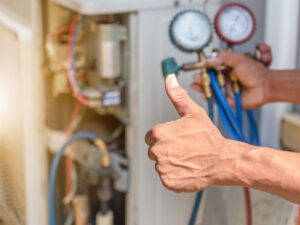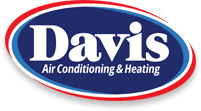Maintain Efficient Air Conditioning to Stay Cool and Save Money
When the summer sun is high in the sky and the temperature readings are right up there with it, there’s little that’s more refreshing than relaxing in the comfort of a well-cooled home. An efficient, effective air conditioning system keeps you cool and happy, but there are factors that can significantly affect the performance and efficiency of your cooling system. The following information will help you understand what those factors are and how they can be addressed to maintain efficient air conditioning throughout the entire summer cooling season.
Air Conditioner Efficiency
High-efficiency air conditioners produce excellent levels of cooling and indoor dehumidification at the lowest possible cost. They use less electrical energy than older models while at the same time making better use of the energy they do consume. The efficiency of air conditioning systems is measured by the unit’s seasonal energy efficiency ratio, or SEER. A typical high-efficiency A/C might have a SEER around 18. Even more efficient models can reach very high SEER numbers in the mid-20s, which indicate outstanding cooling performance.
Whether you have a new ultra-high efficiency air conditioner or an older model with a more modest SEER, the efficiency, performance and operating costs of your cooling system will be affected by multiple factors outside the unit’s efficiency rating. Maintaining efficient air conditioning requires taking care of these factors and creating conditions in which your cooling system can function at its best.
Preventive Maintenance
When working on ways to maintain efficient air conditioning, the best place to start is with the cooling system itself. When you tend to the equipment regularly and keep it in good operating condition, it will work like it’s supposed to when you need it.
- Have preventive maintenance performed – You should schedule preventive maintenance for your air conditioner at least once a year, usually before the start of cooling season. Preventive maintenance is the best thing that can be done to keep your air conditioner running properly for the longest period of time. Maintenance also helps keep efficient air conditioning systems working at or near their original SEER ratings. A preventive maintenance appointment puts a trained and qualified HVAC professional to work checking, adjusting and calibrating your cooling system and making tune-ups and corrections that ensure the equipment continues to work properly. Ask your HVAC contractor about the availability of service contracts that can ensure the maintenance work gets done on time every year.
- Change air filters – Air filters are vital to A/C operation for two main reasons. They help keep your indoor air clean by trapping and holding dust, pollen, dander, mold and other particulates that flow through the air in the system. They also help maintain the airflow that the air conditioner needs to work properly and efficiently. Air filters should be checked at least every month and changed when they get dirty. Dirty air filters will block airflow and won’t be able to capture particulates effectively.
- Clean coils – The evaporator and condenser coils on the indoor and outdoor units — where heat transfer takes place — should be cleaned regularly to make sure they’re not blocked. There should be plenty of open surface area for efficient heat capture and release.
- Clean the outdoor unit – The outdoor component should be kept clean and free of obstructions, including grass, leaves, sticks, mud or other material that could restrict airflow. Any vegetation around the unit should be trimmed back to allow plenty of open space around the cabinet.
Ductwork
After taking care of the air conditioner itself, next give some attention to the ductwork. The ductwork is the series of large pipes that extends from the A/C system to all the rooms in your home. This is the pathway that cool air travels on its way to your home’s interior. Problems in the ducts can seriously impair efficient air conditioning.
- Make sure all sections of ductwork are fitted together tightly and that there are no loose, damaged or detached sections.
- Duct sections can also be fastened together with mechanical means such as sheet metal screws.
- Check connections at registers and vents to ensure ducts are attached there.
- Ensure all connections between ductwork sections are sealed with mastic — a specialized rubbery sealant used on ducts.
- Insulate ductwork with rigid fiber board insulation or wrap ducts with standard blanket-style insulation rolls.
Building Seal
The seal of your home determines how airtight the structure is, which in turn determines when and if air and energy can escape from inside the building. A poorly sealed home can let substantial amounts of cool air leak away unused and equally large amounts of warm air inside. Warm air infiltration causes your air conditioner to work harder to make up for the higher temperature, which reduces performance and efficient air conditioner performance. Make sure you have more efficient air conditioning by taking care of issues with the building seal.
- Find and seal air leaks – Locate and seal gaps, cracks, holes and other openings where air loss could occur. Many of these openings are likely to be obvious, while others may require more detailed processes to uncover. Smaller areas can usually be sealed with silicone caulking. Install weatherstripping around doors and windows, and seal around window and door frames and casings with silicone caulking. Use clear latex caulking to seal around window panes. Look for air leaks around chimneys, plumbing pipes, conduits, exhaust fans or anywhere pipes, wires, fixtures or equipment components penetrate the wall.
- Add or increase insulation – Insulation helps stop the flow of heat, so the more insulation you have in your home, the cooler it will stay indoors during the summer. Add insulation in your home’s walls, ceiling and floor. Make sure the attic is well insulated to prevent heat from accumulating there on hot days. Heat from an attic will radiate downward and increase temperatures throughout the living areas of your home. This will decrease HVAC system efficiency and cause your A/C to work harder to compensate for the extra heat. This wastes energy and drives your bills up higher than necessary.
- Have an energy audit performed – An energy audit can help you pinpoint exactly where there are flaws in your home’s seal and where energy is escaping. It’s a sophisticated procedure that requires the skills and equipment of a professional energy auditor. The auditor will analyze your utility bills for energy use patterns, and he or she will conduct several tests to determine where energy is either being lost or conserved throughout your home. The procedures include thermographic scans that can detect areas of heat loss, surface temperature testing that shows where walls are hotter or cooler than they should be, and infiltrometer testing that can reveal the location of even the best-hidden air leaks.
Control Systems
There are several types of control systems that can be used to promote efficient air conditioning with today’s air conditioning equipment.
- Programmable thermostats – Electronic programmable thermostats are highly effective controllers for modern air conditioners. They give you the ability to set the thermostat to automatically reduce cooling during times when it’s not needed, such as during the workday, and then increase cooling in time to have the house comfortable when you and your family get back from work or school.
- Zoning systems – Zoning systems are used to separate your home into areas, or zones, where temperatures can be individually controlled. If a member of your family prefers a different temperature, he or she can have that temperature in their zone. Zoning also lets you reduce or eliminate cooling in areas of your home you don’t use frequently.
- Demand or CO2 sensors – These sensors can detect when individuals are in a particular area. They regulate ventilation air based on the amount of CO2 in the indoor environment. Better ventilation air control can lead to more efficient air conditioning system performance.
For more information on how to maintain efficient air conditioning performance throughout the summer, check out Davis Air Conditioning and Heating’s air conditioning solutions, or call 888-710-5530 in the greater Houston area or 888-929-0049 in Brazoria County.
Image Provided by Shutterstock.com
You May Also Like

Is My Heat Pump in Fort Bend, TX, Low On Refrigerant?
Your heat pump hums through the cool January mornings in Fort Bend, TX, but something feels off. The air trickling from your… Continue Reading Is My Heat Pump in Fort Bend, TX, Low On Refrigerant?…

How Often Should I Change My HVAC Filter in Pasadena, TX?
The crisp winter air sweeping across Galveston Bay might feel refreshing outdoors, but inside your Pasadena, TX, home, your HVAC system works… Continue Reading How Often Should I Change My HVAC Filter in Pasadena, TX?…

Should I Repair or Replace My Furnace in Houston, TX?
The mercury’s dropped, your furnace is making strange sounds, and you’re wondering whether to nurse it back to health or send it… Continue Reading Should I Repair or Replace My Furnace in Houston, TX?…
